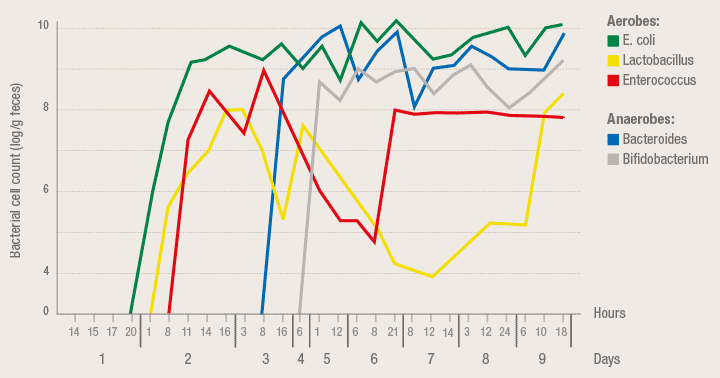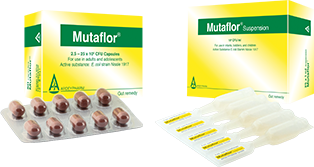The development and significance of gut microbiota
According to general conceptions, the intestines are sterile until the moment of birth. The initial bacterial colonization of the gastrointestinal tract of newborns sets in immediately after birth. The primary intestinal colonization proceeds randomly. Recent molecular biological analyses have started a discussion as to whether microbial colonization might already occur during embryogenesis.
E. coli is the typical initial colonizer of the human gut 1; 2; 3
The colon's oxygen content, still high directly after birth, begins to decrease by colonization with E. coli. Oxygen consumption is caused by the metabolic activities of E. coli leading to anaerobic conditions in the large bowel. Only then does the further colonization of the intestinal tract by strictly anaerobic bacteria begin (e. g. bacteroides, bifidobacteria).
Whether physiological or pathogenic bacteria initially colonize the intestine depends on the environmental conditions that prevail at the time of birth (for example, hospital milieu). 4
The normal Escherichia coli bacteria of the gut
As E. coli is capable of growing under both aerobic and anaerobic conditions, the bacterium has a “pioneering role” in the gradually progressing colonization of the gut in newborns. Normal E. coli-bacteria preferentially colonize the mucous layer (mucin layer) lying on top of the mucosa of the colon. This is where they form a microbial barrier against invading foreign bacteria and owing to their pronounced immunogenic potency, exercise the gut-associated immune system.

4) Schröder H. Entwicklung der aeroben Darmflora bei Neugeborenen nach Kolonisierung mit dem E. coli-Stamm Nissle 1917. Der Kinderarzt 1992; 23(10): 1619-1625.
